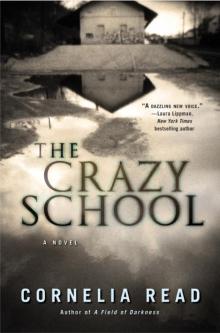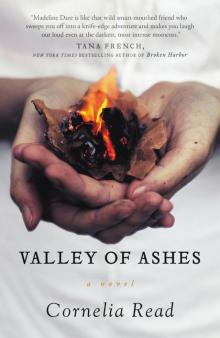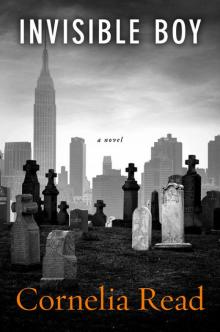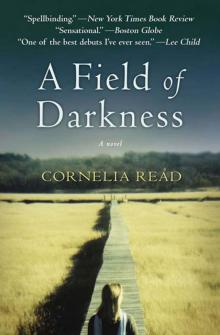- Home
- Cornelia Read
A Field of Darkness Page 3
A Field of Darkness Read online
Page 3
And Lapthorne was a great guy. I meant every word I’d just said to Dean. It was just, you know, history. I couldn’t suppress that little flicker, that little tickling edge of doubt. Two girls dead. One of my relatives in the vicinity.
I imagine most people would deny the possibility of a killer in the family. With us, start counting at Plymouth Rock and you’ll run out of fingers before Paul Revere.
Take Captain John Underhill, who directed the massacre of Connecticut’s Pequot Indians. Before dawn on May 26, 1637, his troops set fire to the tribe’s wigwams and wooden palisades. He reported, “Many were burnt in the fort, both men, women, children. Others forced out, and came in troops . . . twenty and thirty at a time, which our soldiers received and entertained with the point of the sword.”
Governor William Bradford later wrote, “It was a fearful sight to see them thus frying in the fyer, and the streams of blood quenching the same, and horrible was the stincke and sente there of.”
They killed between four hundred and seven hundred people in under an hour. Underhill boasted that the young soldiers with him were sickened by “so many souls gasping on the ground, so thick, in some places, that you could hardly pass along.”
When asked why they had not spared the women and children, he said only, “We had sufficient light from the word of God for our proceedings.”
He was paid a bonus by the crown, used it to buy a chunk of Long Island, an estate he named Killingworth.
The only known depiction of Underhill isn’t from life, it’s a bronze plaque at the foot of a memorial obelisk erected in 1901 by a society of his descendants. He’s shown seated on a throne, reading from a great book to the Indians crouched adoring at his feet. You can just make out the text beneath which his finger trails: Love One Another.
You might argue that he’s just one guy, that lighting all those little kids and their families on fire took place four hundred years ago, that perhaps I should consider moving on.
My answer is that he’s a random pick, the slip of paper pulled first from a tragically full hat . . . nothing up my sleeve.
Not like we don’t have harmless people, too. Needlepointers. Bow-tied collectors of scrimshaw. In Mom’s branch we’ve pretty much universally devolved into a slough of ineffectual bohemianism. We say it’s the “circus blood,” her mother having been adopted.
But still there’s this disturbing frequency of bad guys. I could give you the whole timeline rundown, from “Blankets, Smallpox” through “Napalm, Profits to Dow Shareholders From,” but it doesn’t matter where you start or where you finish, what volume you pull off the shelf or which page it falls open to. One minute somebody’s signing a check to help knock off Allende or whoever and the next you’ve got some dowager confiding over her pre-luncheon bourbon that “Hitler had the right idea,” right before she tosses the Pekinese an ice cube to chase around the library rug.
After a while it’s all a blur. Everything starts to crowd in on everything else, like those tigers running around the tree faster and faster until there’s nothing left but a pool of butter.
I wanted to believe Lapthorne was different, but I wasn’t going to say shit to anybody until I knew for sure. Not the cops, not my paper.
Dean nudged me again, said softly, “Bunny, what—you’re into this guy?”
“Let’s start shooting,” I said. “I need to think.”
CHAPTER 4
The first artificial trap-shooting targets were blown-glass balls thrown up by hand. Sometimes these were filled with feathers, and I always thought it would be spectacularly satisfying to nail one, making it explode in a shower of down and glittering shards.
We had cases of clay pigeons, stout little Frisbees made of pitch and chalk. I handed the gun to Dean, stock first. While I loaded the trap, he thumbed a shell into each barrel and snapped the breech shut. We had earplugs in, pretty much precluding conversation, which was fine with me.
Dean yelled, “Pull!” and I sent the first disc winging across the corn. He hit it dead on. One second you could see it and the next there was nothing but smoke—just a mist of black powder against the sky.
I knew he would have preferred shooting woodchucks and rats, to placate his Swiss-Scots compulsion for industry, but my interest in guns has never extended to taking out anything with a heartbeat.
When it was my turn I tried to stand loose, a little bend to my knees.
You don’t have the gun at your shoulder when the clay’s released. You have to “mount” it from a resting position, remembering to bring the stock to your cheek, not vice versa.
Sight down the barrels and imagine the clay’s leaving a trail of smoke, like a dogfight biplane. Draw a bead on that ribbon of hypothetical vapor and swing up it, pulling the appropriate barrel’s trigger just as you pass your target.
You want all of this to be one smooth arc, but if you think about it too much it breaks into all these separate pieces. I read once that King George V kept a shotgun in his bedroom so he could practice this lift-and-swing over and over, whenever he couldn’t sleep. No mention of whether or not he kept it loaded.
I called, “Pull!”
Gun to cheek, swing, pull the first trigger, follow through . . .
You can’t stop moving when you fire, since everything takes a few fractions of a second—the finger’s response to the brain’s command, the flight of the shot down the barrel and through the sky. You’ve got to shoot ahead of the clay, at the spot your little pigeon will be flying through by the time your reflex’s shit is packed.
I missed it. Concentrate. Visualize the sequence again, see yourself hit it. Start over. Deep breath . . .
“Pull!” I followed up, up . . . pulled the second trigger and smoked the thing, making Dean whistle through his teeth.
I broke the gun and the empty shells clicked out an inch. I hooked a thumbnail under the rims and tossed them into the little pile Dean had started.
I was all jumpy, ended up taking the rest of my shots totally spaced out.
Of all my cousins, why Lapthorne? Why not porcine Ogden with that horrible laugh? Sulky Jake of the short, damp fingers? Binty, even . . .
Dean’s turn. He was shooting way better than I was. Even with earplugs I flinched at every crack of the gun.
We kept going until the sun was halfway down the sky, the day cooling but still muggy.
Dean stood up and stretched. I went to gulp warm water from the spigot.
He followed, touched my shoulder. “The dog tag thing. You want to just let it go?”
I shook my head, wiping the back of my hand against my mouth.
“Those girls who died,” I said. “It would drive me crazy. I have to know.”
“Let the police handle it, then.”
“What if it’s just some really weird coincidence?”
“What if it’s not?”
I dropped my head and sighed, scuffing my shoe across the clods of dirt. “If it’s not, if he did it . . . I mean, come on. Of course I’d go to the cops. But I want to check it out first.”
He looked away.
I started pacing. “Maybe he was in Paris in ’69 dropping acid, or doing some investment-banker training program, or whatever.”
He cocked an eyebrow. “And?”
“And I don’t know,” I said, taking his hand. “I need to see how much I can find out on my own. Honest to God—like just whether Lapthorne was even here in the right year, okay?”
I tried my most winning smile and Dean was completely unmoved.
He handed me the gun. “If you find anything, you have to tell the cops.”
“Scout’s honor,” I said, holding up two fingers in the Brownie benediction.
“Jesus. You chicks from downstate.” He shook his head, kneeling down by the trap.
We plugged our ears again and started up.
I hit the first two.
On the strength of that I figured I’d practice the only trick thing I knew, but had never mastered. I wished Da
d had kept it together long enough to teach me how to shoot from the hip, something he’d learned from the guy who was Sean Connery’s Thunderball gun coach.
Instead I’d heard the story from my mother, whenever it was James Bond Week on the Million-Dollar Movie.
I tried it for all the shots on my last two turns, and missed every goddamn one.
We got takeout from Sal’s Birdland, “Home of the Sassy Sauce,” and ate cross-legged on our Naugahyde, dunking the greasy wings in sweet yellow syrup and scarfing down potato wedges in batter savory with black pepper and sage.
“I think I need to talk to Kenny,” I said, when we lay groaning amidst wadded paper towels and Styrofoam clamshells piled with glistening bones.
Kenny was an old friend of Dean’s, an ex-cop who tended our favorite skanky dive bar downtown.
“Probably Kenny and Mom,” I said.
“There’s a terrifying combo.” Dean put his head in my lap and dangled his feet off the far end of the purple sofa.
I ran a fingertip along his jaw. “I need to know more about those girls, and more about Lappy.”
“Lappy?” He emitted a snort of derision.
“So I don’t call my relatives Wimpy and Weasel. You want to give me a hard time, go after Winthrop and Roderick.”
He closed his eyes and smiled. “You married beneath you.”
“All women do,” I said, leaning down to kiss him, but he was already fast asleep.
I edged out from under him and tucked a pillow beneath his head. Married, the two of us. How weird was that? I mean, when I was a kid and someone asked what kind of husband I wished for, I always answered, “The kind that pays child support.”
Not cynicism, exactly, just resignation. An honest appraisal. Dads who stayed on the team for their kids once things went to shit were a rare species in my childhood landscape.
Grownups didn’t seem to pick spouses very well. No one had immunity. No one ever saw it coming. They had weddings and kids and houses and obviously thought it would turn out okay. I figured I could get away with minding my own business for a few years, building forts and what have you, but at a certain point you got overcome by these powerful and irrational forces that made you fall in love with someone who could turn out to be ridiculous to spend a life with, even if you were both otherwise perfectly decent people.
My parents hit the fan in 1967. He stayed on Long Island and she lit out for Honolulu, me and my sister in tow. California was the geographic compromise Mom struck with Michael, the second husband she’d acquired on Oahu.
Mom and Michael had my little brother before they broke up in ’72, around the time Dad decided he didn’t want to be a stockbroker anymore. By ’76 he was in California, too, working at the Chevron in Malibu and living in his camper. He built a big bed in the back and kept all his stuff underneath it. That’s when he started giving me castoffs, things from his past life that didn’t fit anymore.
He needed room for the alfalfa sprouts he’d learned to grow in Hellmann’s mayonnaise jars with Handi Wipes rubber-banded across their tops. He stopped paying child support. He discovered pita bread, made sprout-and-tuna sandwiches when my sister and I came to visit on school vacations. She was short enough to sleep in the hammock that hooked into brackets on either side of the windshield and I got the fold-out cot under the pop-top. We went to Disneyland a lot, which must have been hard for him to swing.
These days, Dad was still out in California, but Mom had moved home to Centre Island, the spit of land hooking into Oyster Bay on the north shore of Long Island. Her family had been there since 1698, but she lived with this guy Bonwit. Had they gotten married, he would have been stepfather umpteen. Not the nastiest of the bunch, to date, but he was close.
A car rattled up Green Street and Dean stirred in his sleep on the sofa beside me.
“I got lucky,” I said, quietly so he wouldn’t wake up all the way. “I fell in love with you. It might turn out okay forever, but even if it doesn’t I’m lucky right now.”
He straightened out one leg, and I stroked his hair until he settled down again.
I stood up, thought about calling Mom to find out more about Lapthorne, but I had an article to crank out: “Hot Drinks for Winter”—not a topic I really wanted to tackle on another machete-humid evening, but it was due first thing and my boss was, to be kind, a loathsome and unforgiving prick.
I cued up the Allman Brothers instead, speakers pointed away from Dean. While the computer booted, I made myself a tall iced coffee and broke out my handy-dandy International Bartender’s Guide to find some cocktails fellow Syracusans might want to drink après-ski, après-skate, or après-shovel-off-le-driveway.
I was flipping pages: gin, rum, cider, bupkes. . . . Not a peep from the journo-muse until this punch called “Flames over New Jersey” snapped the bitch awake like a pistol start. I hit the keyboard at a dead sprint straight off the chocks, caffeine and “Whipping Post” blasting me through the finish tape hours later.
I stood up, all jangly, printed the file and cracked my neck and looked at the clock. Just shy of midnight, way past any hope of calling Mom. The street was quiet, Dean was still conked on the sofa, and I didn’t want to think about dead girls.
Fresh pages in hand, I stepped onto our rickety porch to proofread. Once tipped back in a wicker chair, I just stared up at the mackerel sky instead: all those fat little clouds, bright and regular as abacus beads.
The moon glowed from a pocket of nacre, mother-of-pearl pinks and blues and silvers. Seven years since I’d last seen Lapthorne, the night before Cousin Ogden IV’s wedding.
I propped my feet on the railing and let my fistful of paper sift to the paint-thick floor.
It had been a Labor Day weekend Friday. I flew into LaGuardia from California, seventeen years old and about to start my last scholarship year at boarding school—never suspecting Mom would ditch Carmel for Oyster Bay by graduation, that we’d all be sucked back into the ancestral maw.
The rehearsal dinner was black tie, held in the gardens behind the great stone house Ogden the First had erected in Locust Valley, acres and acres of them, stretching down to the Sound.
It must have looked like a circus from the water: thousands of fairy lights twining through boxwood hedges, strings of paper lanterns arcing between stands of maple and copper beech, brick paths shimmering from folly to terrace to allée.
The seating diagram had me at a Table 16, off to the side of the first tent and behind a pole. I hadn’t recognized the other names, so when I saw Lapthorne lounging in one of the little gold chairs, I figured I must’ve gotten the number wrong.
He saw me and stood up, crooking a finger to draw me over. Same easy slouch, even in a tuxedo. He sported a black raw-silk eyepatch, to match the cummerbund, and his dark hair curled at the edge of his collar.
I looked at his hooked blade of nose, the face just barely shy of too long, too narrow—thought of a Byron couplet: One shade the more, one ray the less / Could half impair that nameless grace.
The table was empty but for him, our fellow guests preferring the bar. Unoccupied chairs faced expectantly inward toward low, candle-spiked arrangements of ivy and white lilies.
“Chère cousine,” he said, “over here, right next to me.”
I must have looked a little confused, because he added, “Don’t tell me you’ve forgotten poor old Lapthorne. . . .”
Impossible idea. From, like, the moment I turned eleven, I’d dreamed of winching every possible limb around the guy so as to spend at least a week licking his neck.
Judging from the little half-smile now playing across my cousin’s mouth, this wish had not exactly been a secret.
“Couldn’t forget the man who so kindly baited my first trout’s hook,” I said, cool as I could manage. “I just didn’t see your name down for this table.”
“I switched the place cards,” he confided.
“Wicked thing,” I said. “Hope the lady’s worth it.”
“She
is indeed,” he answered.
Then he leaned down to kiss my cheek, pausing long enough to say, directly against my ear, “Christ, Madeline, you turned out stunning.”
I blushed in my sham finery—cast-off tux pumps with grosgrain bows, thrift-store black cotton caftan slit up the sides and decked with gold braid at the neck and wrists. Around my waist was the burgundy satin sash off an old brocade dressing gown, and my string of fake pearls fell to my knees. It had all seemed kind of sardonic Moroccan when I put it together, but I now felt full-on Sgt. Pepper doorman.
Lapthorne straightened up and pulled out my chair. The moment we were seated, staff in drip-dry livery arrived to grace us with salads.
I watched my cousin open his napkin with an impeccable flick beneath the table, then select the correct fork without so much as a glance at his choices. When we’d finished, he and I would each leave, alongside the identically angled cutlery on our plates, exactly one piece of lettuce as a testament to the salad’s quality.
I’d described this custom to Dean in a restaurant once. After he finally stopped laughing, my husband assured me that the busboy would be deeply impressed.
When our salad plates were whisked away, Lester Lanin cued up the band in the next tent, starting off with “Night and Day” as he always did.
“Promise me a spot on your dance card?” asked Lapthorne.
Oh shit. No no no no no.
“Never went to, ah, dancing school,” I said. “California and everything . . .”
“Dancing school’s a load of crap,” he drawled. “Spent years myself under the stern eye of Mrs. De Rham. Only useful thing I learned was that one can flush lit cherry bombs down the toilets at Piping Rock.”
“Still, I can’t . . . I mean, even the boxstep . . .”
“Don’t be nervous,” he said. “You know better. Have since you were five years old, Madeline.”
He glanced around the room. “This is all just . . . perfume,” he said, dismissing the Merchant-Ivory splendor with a casual wave of his hand. “Nothing to be afraid of, unless you confuse it with sustenance.”

 The Crazy School
The Crazy School Valley of Ashes
Valley of Ashes Invisible Boy
Invisible Boy A Field of Darkness
A Field of Darkness